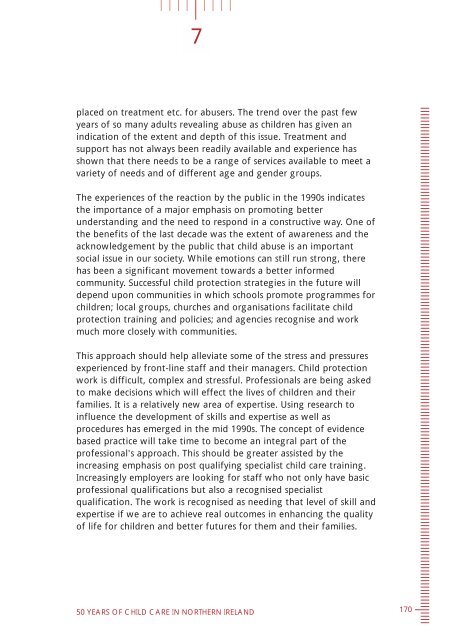childcare-50years
childcare-50years
childcare-50years
You also want an ePaper? Increase the reach of your titles
YUMPU automatically turns print PDFs into web optimized ePapers that Google loves.
7<br />
placed on treatment etc. for abusers. The trend over the past few<br />
years of so many adults revealing abuse as children has given an<br />
indication of the extent and depth of this issue. Treatment and<br />
support has not always been readily available and experience has<br />
shown that there needs to be a range of services available to meet a<br />
variety of needs and of different age and gender groups.<br />
The experiences of the reaction by the public in the 1990s indicates<br />
the importance of a major emphasis on promoting better<br />
understanding and the need to respond in a constructive way. One of<br />
the benefits of the last decade was the extent of awareness and the<br />
acknowledgement by the public that child abuse is an important<br />
social issue in our society. While emotions can still run strong, there<br />
has been a significant movement towards a better informed<br />
community. Successful child protection strategies in the future will<br />
depend upon communities in which schools promote programmes for<br />
children; local groups, churches and organisations facilitate child<br />
protection training and policies; and agencies recognise and work<br />
much more closely with communities.<br />
This approach should help alleviate some of the stress and pressures<br />
experienced by front-line staff and their managers. Child protection<br />
work is difficult, complex and stressful. Professionals are being asked<br />
to make decisions which will effect the lives of children and their<br />
families. It is a relatively new area of expertise. Using research to<br />
influence the development of skills and expertise as well as<br />
procedures has emerged in the mid 1990s. The concept of evidence<br />
based practice will take time to become an integral part of the<br />
professional's approach. This should be greater assisted by the<br />
increasing emphasis on post qualifying specialist child care training.<br />
Increasingly employers are looking for staff who not only have basic<br />
professional qualifications but also a recognised specialist<br />
qualification. The work is recognised as needing that level of skill and<br />
expertise if we are to achieve real outcomes in enhancing the quality<br />
of life for children and better futures for them and their families.<br />
50 YEARS OF CHILD CARE IN NORTHERN IRELAND<br />
170


